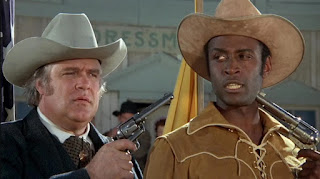People who did not live through the first half of the 1970s have little facility to appreciate just how forcefully and stridently those dark years undermined the cultural norms and comfortable predictability of a collective status quo from Dallas to Da Nang. In the summer of 1974, with the Paris Peace Accords in tatters, Soviet ambitions mounting by the day, inflation soaring, cities around the world positively riven with racial and inter-generational violence, and the United States' first serious flirtation with Presidential impeachment in over a century, many comfortable middle-class moviegoers were legitimately uncertain if basic social order could ever be counted upon again.
What better time, then, to escape to the movies? And what better explanation for the extraordinarily fecund summer of cinematic masterpieces that the world enjoyed that year, from the Godfather II to Chinatown to Celine and Julie Go Boating.
And then, then there's Blazing Saddles -- a movie whose stark genius was to comfort the masses in their loss of existential ramparts, by taking the crumpled wreckage of those ramparts and setting it on fire. An unflinchingly subversive statement-piece on the toxic nonsense that is modern racism, Mel Brooks' uproarious western (fashioned as a parody of High Noon, but -- oh by the way -- with a black sheriff) sidesteps dismissal as a preachy liberal reprimand by delicately seasoning its bang-on-the-nose main treatise with much quieter but no less effective sarcastic contretemps. Like only Mel Brooks can pull it off, the assorted vignettes of his story dish scathing social comment on any number of still-relevant cultural and historical failings, from corporate-political back room subterfuge, western-era romanticism, capital punishment, and religious hypocrisy, to middle-class death rituals, alcoholism, careerist bureaucrats, sloppy anachronisms in classic movie scripts, the Native American genocide, and ultimately even Hollywood itself.
What better time, then, to escape to the movies? And what better explanation for the extraordinarily fecund summer of cinematic masterpieces that the world enjoyed that year, from the Godfather II to Chinatown to Celine and Julie Go Boating.
And then, then there's Blazing Saddles -- a movie whose stark genius was to comfort the masses in their loss of existential ramparts, by taking the crumpled wreckage of those ramparts and setting it on fire. An unflinchingly subversive statement-piece on the toxic nonsense that is modern racism, Mel Brooks' uproarious western (fashioned as a parody of High Noon, but -- oh by the way -- with a black sheriff) sidesteps dismissal as a preachy liberal reprimand by delicately seasoning its bang-on-the-nose main treatise with much quieter but no less effective sarcastic contretemps. Like only Mel Brooks can pull it off, the assorted vignettes of his story dish scathing social comment on any number of still-relevant cultural and historical failings, from corporate-political back room subterfuge, western-era romanticism, capital punishment, and religious hypocrisy, to middle-class death rituals, alcoholism, careerist bureaucrats, sloppy anachronisms in classic movie scripts, the Native American genocide, and ultimately even Hollywood itself.
But of course all of these are but fragmentary asteroids, snatched into their recurring orbits through our perception by the awesome gravity of the great comic genius' unwavering contempt for the preposterousness of racism. Far beyond its veritable fusillade of perfect laugh-lines, every major structural element of the film is dedicated to confronting white hysteria about skin colour and its supposed stop-everything importance. With Blazing Saddles, it isn't so much that race and its neutrality in matters of character are never far from mind -- it's that they are never for a second anywhere but dead-center in the creative choices that most stay with us after taking it all in. Most prominently these choices included the preternaturally unforced friendship between the two main characters (Gene Wilder and Cleavon Little, the latter chosen when the studio refused to insure Richard Pryor as a drug-addled lunatic), an elaborate registration procedure for those who would aspire to hate a black guy, and above all the crucial plot device of setting up the Sheriff's new town to destroy itself, by first destroying him.
One of only twelve films in history to be preserved in both the National Film Registry and the Library of Congress, Blazing Saddles stole American racial consciousness out from under a credulous public by blowing audiences away as nothing more than an irreverent grab-bag of disconnected jokes. Indeed it is no small testimony to Brooks' craft as a writer and filmmaker that even some of the most august and jaded critics completely missed the point that they'd just been taught a life-altering lesson about just what does and doesn't matter, at a time when almost nothing could be relied upon to matter anymore. A smash success, the film was at its time only the tenth movie in history to break $100 Million in U.S. domestic box office.
I hope everyone will plan to join us Wednesday, 6 April, at 6:31pm, for what may be the most iconic and important comedy in ... well, in the history of the world.





No comments:
Post a Comment